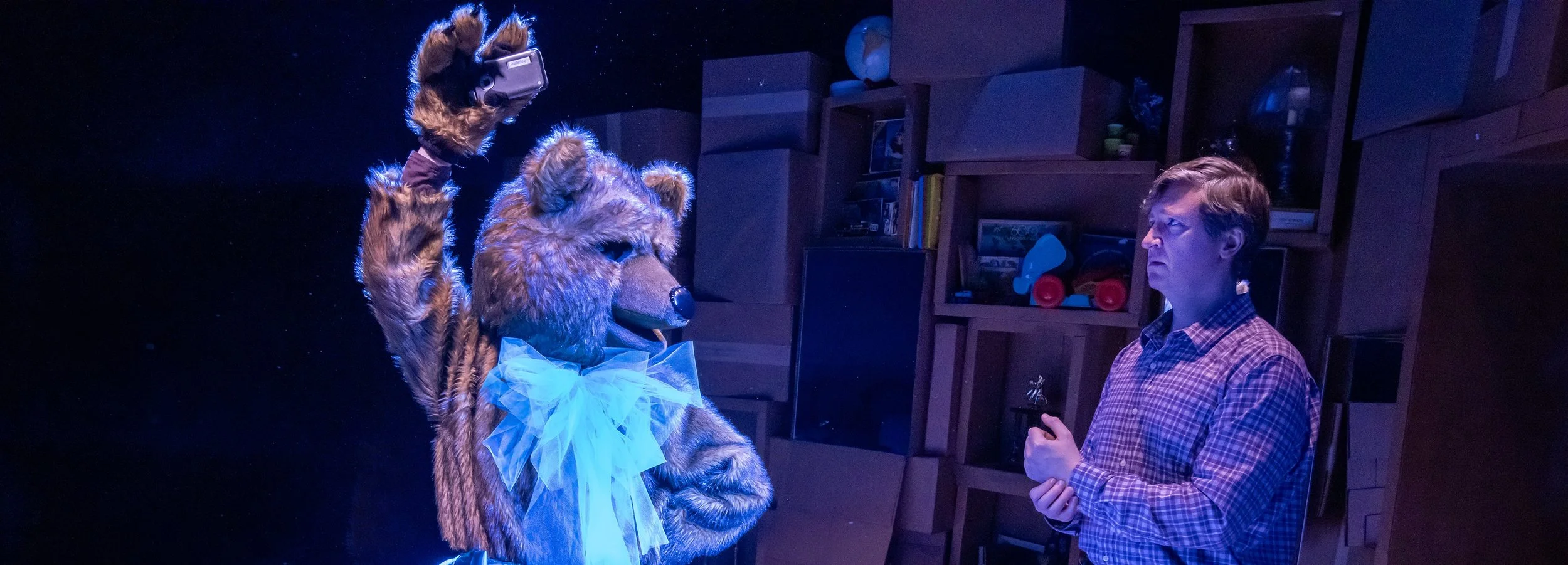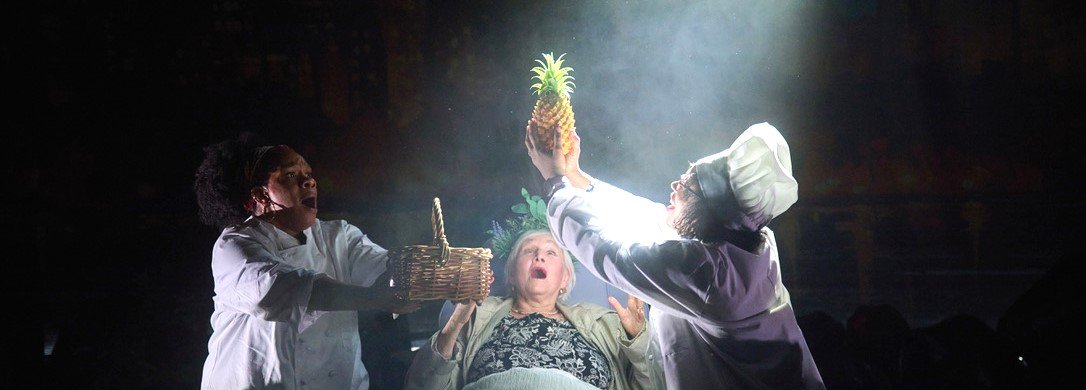In the new drama Brooklyn Laundry, John Patrick Shanley—both author and director—is toying with the impact of uncanny coincidences on the narrative trajectory of his principal characters. That theme should ring a bell with fans of Moonstruck, the intoxicating 1987 film comedy for which this echt New York playwright won a best original screenplay Oscar.
The Slow Dance
Fans of David Letterman may recall when he used to send a costumed staffer out to New York streets for stunts like “Can a Guy in a Bear Suit Hail a Cab?” and “Can a Guy in a Bear Suit Get into a Strip Club?” As in those sketches, someone wearing a bear costume makes incongruous appearances during The Slow Dance by Lisi DeHaas—except this time the question is “Can a person in a bear suit liven up an emotionally and narratively deficient drama?”
The Effect
Lucy Prebble’s The Effect was first staged in 2012, presented at Barrow Street Theatre in the Village in 2016, and then revived at London’s National Theatre in 2023. That revival now comes to the Shed. It is a psychopharmacological love story: Tristan (Paapa Essiedu) and Connie (Taylor Russell) are participants in a clinical trial for a new antidepressant, overseen by Dr. Lorna James (Michele Austin). Tristan is an extroverted working-class Londoner from Hackney with a mix of confidence and self-deprecation, while Connie is a more tightly wound, introverted psychology student whose participation in the study is apparently less about getting paid than about intellectual interest.
Tuesdays with Morrie
Len Cariou—Stephen Sondheim’s original Sweeney Todd—plays the title role in Sea Dog Theater’s revival of Tuesdays with Morrie by Jeffrey Hatcher and Mitch Albom. Amid the stark, solemn beauty of Charles Otto Blesch and Leopold Eidlitz’s Romanesque-revival chapel at St. George’s Episcopal Church on Stuyvesant Square, director Erwin Maas has built a fleet, music-filled production around the distinguished Canadian actor, who’s sharp and feisty at 84. In the role of a professor experiencing the galloping effects of amyotrophic lateral sclerosis (also known as ALS or Lou Gehrig’s disease), Cariou steers clear of mawkishness with a performance that’s wry and witty from beginning to end.
Maiden Voyage
In spite of the progress that women have made over the years when it comes to achieving gender equality, Cayenne Douglass’s new play, Maiden Voyage, shows that women need to stop overcompensating and simply act authentically in their workplace. Directed by Alex Keegan, and coinciding with Women’s History Month, this drama takes one five fathoms deep into the ocean and a distaff Navy world.
Remember This Trick
Antisemitism, as “the world’s oldest hatred,” appears to defy time limits. It may cloak itself in the cultural norms of a particular society, but similar tropes, accusations, and treatises, sometimes tweaked, resurface in different locations. Remember This Trick, deftly directed by David Herskovits, who also doubles as sound designer, is a collaborative, thoroughly engaging exploration of antisemitism across millennia, and the resilience and survival of those who experience it.
The Seven Year Disappear
Part coming-of-age story, part domestic drama, and part mystery tale, Jordan Seavey’s The Seven Year Disappear is a deeply unsettling work that ponders the thorny question: How far should an artist go to mine his or her life for art? Directed by Scott Elliott, Seavey’s play reveals the darker side of the art world, when a renowned artist disappears for seven years and her son goes into free fall.
The Ally
The Ally is eminently watchable, although it seems like it shouldn’t be. Unless, that is, you go to the theater to be lectured on geopolitical issues. Itamar Moses’ new drama runs more than 2½ hours, and you might feel like you spend about two hours of it watching one character, who’s speaking to another person on stage, deliver a speech that elucidates a stance on the Israel-Palestine conflict, complete with historical references, geographical context, statistics and preemptive rebuttals.
Pericles, Prince of Tyre
Pericles, the first of Shakespeare’s late romances, is the only play not in the First Folio. Most critics agree that the first two acts are by someone else, possibly the work of George Wilkins, who wrote the “prose narrative” on which the play is based, and from which Fiasco Theater’s galloping production sometimes borrows. But the last three acts are the Bard, and this play, even though Ben Jonson called it “a mouldy tale,” has proven resilient.
Deadly Stages
Deadly Stages, a new murder mystery–melodrama by Marc Castle and Mark Finley, is a strange pastiche. It follows backstage shenanigans that involve a temperamental grande dame of the theater, a younger, theatrically untrained movie star, and assorted hangers-on: the reliable supporting actor, the producer, the director, and possibly a scheming upstart. Anyone who hasn’t seen All About Eve should begin to prepare now.
This Is Not a Time of Peace
The personal is political. This familiar adage is one of the points Deb Margolin makes in the awkwardly staged and often pretentious-sounding play This Is Not a Time of Peace. Other points: History repeats itself. We are the sum total of everything we’ve experienced. Beware despots. Professional ambition can clash with personal ethics. Time does not heal everything. Trumpism equals McCarthyism.
Warrior Sisters of Wu
The Qiao sisters, Qing and Wan, have not been well known outside Chinese history. They first appeared as minor characters in the 14th-century Chinese novel, Romance of the Three Kingdoms. Since then, they have turned up as supporting characters in the Chinese opera Fenghuang Er Qiao and, most recently, as protagonists of movies like John Woo’s Red Cliff (2008) and the video game Dynasty Warriors. For Warrior Sisters of Wu, Damon Chu draws on their shared mythology but also on Much Ado About Nothing and Pride and Prejudice. While Chua’s writing doesn’t reach the literary heights of Shakespeare or Austen, his acknowledgment of the rich cultural heritage and archetypes ranging from ancient China to 19th-century England root Warrior Sisters in dramatic material that promises the best that hundreds of years of storytelling have to offer.
Sunset Baby
Sunset Baby begins with Kenyatta (Russell Hornsby), a legend of the Black Liberation Movement who has spent time in prison for robbing an armored truck, speaking hesitantly into a camcorder—the video feed is projected above the stage—about the uncertainties of fatherhood: “Fatherhood. Complex. Complicated. An abstract concept. Not clearly definable.” Just how complicated it is in his particular case is soon revealed when he tries to reunite with his estranged daughter, Nina (Moses Ingram), a woman who has built a hard, protective shell around herself and does not want to hear a whiff of nostalgia from a man she barely knows. She doesn’t even want Kenyatta to say her name: “Do not say my name as if you’ve said it a hundred times. As if we have this familiarity between us. We are not familiar. We are not close.”
Where Women Go
Theatergoers who have followed the career of the late Tina Howe now have an opportunity to see her final work, Where Women Go, a triptych of one-acts that invites one on an absurdist journey through New York City. Directed by Aimée Hayes, this intimate work has some transcendent moments, but its poetic flights are too often thwarted by its gimmick-driven scenarios.
The Christine Jorgensen Show
Much of the audience at The Christine Jorgensen Show seemed to be, as the phrase goes, of a certain age, and maybe that’s understandable. Who under 60 knows who Christine Jorgensen was? Yet for a time in the 1950s she was, as a character says in Donald Steven Olson’s play with music, “one of the most famous human beings in the world.”
On Set with Theda Bara
On Set with Theda Bara is a single-actor comedy-drama by Joey Merlo that revolves around the suspicious disappearance of a genderqueer teenager. In this pastiche of film noir, Merlo piles mystery upon outlandish mystery, and David Greenspan leads the spectators (limited to 50 a performance) through a 65-minute, mazelike tale that’s at once intriguing and mystifying.
Munich Medea: Happy Family
A program note by Corinne Jaber, the playwright who is making her debut with Munich Medea: Happy Family, says that her work is meant to “shine light into places that are difficult to look at” and not “judge nor accuse, but to reveal.” She accomplishes that, but the story line of her fairly static, albeit well-cast, play feels like one we’ve (unfortunately) seen before. At this point, more than 25 years after How I Learned to Drive won the Pulitzer Prize, sexual abuse is no longer a novel subject for the stage.
The Apiary
A dystopian story about environmental catastrophe and death is not necessarily where one would expect to find humor, but Kate Douglas achieves a darkly comic triumph with her new play, The Apiary. The production at Second Stage Theater fires on all cylinders, including Kate Whoriskey’s superb direction and the uniformly stellar cast, who navigate the play’s mixture of absurdity and sincerity with precise and convincing performances.
Russian Troll Farm
Sarah Gancher’s Russian Troll Farm at the Vineyard Theatre is a nightmare version of an office sitcom, set during the run-up to the 2016 U.S. election. Quirky worker bees perform evil tasks while navigating interpersonal relationships and an ever-present authoritarian state looming over them, in the form of Vladimir Putin’s portrait on the wall and an armed soldier keeping watch. The professional Internet trolls in St. Petersburg, at the benignly named Internet Research Agency, send out vast numbers of tweets and posts using fake accounts—a “mix of celebrities, eggs, fake individuals, and pundits”—to disseminate misinformation. In almost every case, Gancher uses real Russian troll tweets, a documentary reality that makes the set-up even more nightmarish.
White Rose: The Musical
Those reflecting on history often use a wide brush and focus on major figures to the exclusion of perhaps less renowned but significant players. Hitler, the Nazi war machine, and concentration camps are front of mind as regards World War II in Europe, but how many people remember dissidents and resistance from within Germany? The White Rose, one such resistance group, presented a credible threat to Nazi lies, propaganda, and blind devotion to the Führer. Brian Belding’s White Rose: The Musical is an homage to some of those “good Germans” who risked their lives and paid the ultimate price for defying Hitler and his henchmen.


























